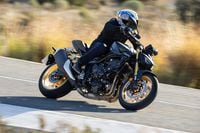Over the years we have come to expect new Honda models to arrive in showrooms with, if not a premium price tag exactly, then certainly one that reflects the high quality of engineering and componentry associated with Japan’s largest manufacturer.
Editor’s note: The 2025 Honda CB1000 Hornet SP is not available for sale in the United States. No word from American Honda if this vehicle will arrive during 2025.
But it all changed with the Honda CB1000 Hornet SP. In UK showrooms at under 10,000 pounds sterling, this 155 hp sport naked undercuts not only the Suzuki GSX-S1000 but also the Yamaha MT-10 and even the Yamaha MT-09—and that’s despite it being festooned with high-end Öhlins TTX rear suspension and Brembo Stylema front brakes. At a time when the major manufacturers are tripping over each other to bring the most technologically advanced two-wheel computers to market, Honda has thrown a spanner in the works by focusing instead on price and value. And for those who aren’t bothered whether it’s Brembo on Nissin, Öhlins or Showa doing the stopping and damping, there’s a base model, non-SP, that rocks up at 9000 pounds.
Both Hornets share the same twin-spar frame, Showa 41mm USD fully adjustable forks, wheels, and rubber (Bridgestone S22 or Dunlop Sportmax Roadsport 2), rider aids, dash, and electronics. The SP gains that Öhlins TTX shock and Brembo brakes along with an up-and-down electronic quickshifter and is only available in black. Both get reworked Euro 5 versions of the 2017 Fireblade’s inline-four, but the SP gains a neat little exhaust valve which pushes peak power to 155 bhp compared to 150 bhp of the standard bike.
Hornets, of course, have always given value. The original 1998 CBR600-based CB600F earned a reputation as a practical and bulletproof middleweight with a sharp sporting edge. When Honda reintroduced the Hornet brand back in 2023 with the competitively priced CB750 parallel twin, it went on to become Europe’s bestselling naked middleweight that year. And now this new CB1000 looks set to take the Hornet franchise to a new level.
For starters, it’s difficult to see where or how Honda has contained costs. Budget-conscious Hornets have traditionally missed out on the sumptuous finish of their flagship stablemates, but seemingly not so much this one. The odd cost-saving detail such as a nondetachable subframe hints that savings may have been made in hidden corners of the motorcycle, but its rich black paint and contrasting gold wheels largely embody a bygone era of luxury speed.
Delve a little deeper and you discover that the Hornet has comparatively basic rider aids and riding modes—there’s certainly no launch control here. Three riding modes—Standard, Sport, and Rain—do the heavy lifting while User modes are available for personalization. There are three engine power and engine-braking modes, and three levels of switchable HSTC traction control. The ABS can’t be adjusted and, like the traction control, isn’t lean-sensitive as there’s no IMU on board. In all honesty, I suspect many potential customers won’t care.
Once settled into a relatively low 809mm/31.9-inch seat, you face a clean and understated cockpit featuring uncomplicated switch gear and, by 2025 standards, a smallish and unshowy 5-inch color TFT dash complete with Honda’s RoadSync connectivity. The tank flares at the front in the Hornet tradition but is nicely waisted at the knees. One-piece bars lean you into a comfortably sporting stance, while Showa fork-top adjusters add an air of quality… Again, not much sign of the accountants’ meddling here.
The 999cc inline-four has been retuned to match the needs of a naked streetfighter (and cleaned up to meet Euro 5+) and now delivers a claimed 155 bhp at 11,000 rpm and 76.7 lb.-ft. at 9000 rpm. That is somewhat down on the 2017 Blade’s 189 bhp but peak power and torque arrive much lower in the rpm, with the aim of making it much more usable on the road than the ultra-focused sportbike.
You immediately feel this torque and drive lower in the rpm. The midrange drive is pure muscle. Honda claims a curb weight of 212 kilograms/467 pounds but it feels lighter and the blend of grunt and agility makes for a slick and commanding presence in the city. The steering is delightfully light—more like a Triumph Street Triple than a big-cube roadster—while that narrow seat and tank mean, as a short rider, I could get two feet securely to the ground without problem.
Out in the country, it gets even better. It’s hard to overstate the grunt that its torque-focused tune delivers. Like the 2017 Fireblade on which its engine is based, the Hornet sounds raucous for a standard bike—especially a standard Honda—and with the revs hovering mid-tach it punches out of turns, that pipe wailing, as you short-shift through the upper midrange. Lovers of big and ballsy inline-fours will adore this bike’s personality and aggression, as well as its stunning real-world performance.
That easy drive and quick, accurate steering mean the Hornet SP comes alive in the hills. Direction changes are rapid, the chassis is planted, and it’s as happy carrying corner speed and high angles of lean like a pure middleweight sportbike as it is going down a couple of ratios on the smooth quickshifter, turning hard to square off the corner, and gunning out again.
Meanwhile, the Bridgestone S22 tires warm up quickly and offer enough grip to keep you leaning all the way to a knee. The Brembo Stylema calipers and 310mm discs upfront are strong and progressive but at high speed, when shaving a few mph rather than stopping hard, I expected more bite from a premier setup.
My only major criticism of the SP during our test ride was the overactive and unsophisticated traction control, which can’t be deactivated on the move and defaults to a saved standard setting whenever the ignition is switched off and on again. When the TC intervenes, it does so rather abruptly and without the subtlety we’d expect in 2025, while the reintroduction of the power is a fraction too slow.
Our test route was all about fun, with little attention paid to the details of everyday riding. But on the brief stretches of normal asphalt we encountered I found the riding position roomy and comfortable at legal speeds, while engine vibes are minimal at high revs, and heated grips and limited luggage are optional extras. Pillions are going to be brave or small, but despite the obvious lack of bodywork, there’s no reason you couldn’t rack up some miles on the Hornet all year around.
This machine is exceptional value for money. The rider aids may be relatively basic and the brakes could be a little sharper, but for real-world fun this 155 hp package ticks all the key boxes. It’s hard to place, though. Is the Honda Hornet 1000 SP more comparable to Yamaha’s MT-09 or MT-10? Would you consider a Kawasaki Z900 over the Hornet given that the former is heavier, less powerful, and more expensive? Or is the real competition Triumph’s Street Triple 1200? Or BMW’s F 900 R (105 hp) or S 1000 R (165 hp)?
The problem for the competition is that anyone in the market for any of those nakeds will now feel compelled to take a serious look at the Hornet SP as there is nothing even close to delivering similar 155 bhp thrills for under 10,000 pounds.






















/cloudfront-us-east-1.images.arcpublishing.com/octane/U4I7G625B5DMLF2DVIJDFZVV6M.jpg)
/cloudfront-us-east-1.images.arcpublishing.com/octane/B6XD6LS6IVCQPIU6HXDJSM3FHY.jpg)
/cloudfront-us-east-1.images.arcpublishing.com/octane/ICL63FEDDRDTTMINYICCEYGMDA.jpg)
/cloudfront-us-east-1.images.arcpublishing.com/octane/FCGZHQXRBZFLBAPC5SDIQLVF4I.jpg)
/cloudfront-us-east-1.images.arcpublishing.com/octane/WNOB6LDOIFFHJKPSVIWDYUGOPM.jpg)

/cloudfront-us-east-1.images.arcpublishing.com/octane/X33NU3E525ECRHXLNUJN2FTRKI.jpg)
/cloudfront-us-east-1.images.arcpublishing.com/octane/6KKT5NNL2JAVBOXMZYS5ZO76YA.jpg)
/cloudfront-us-east-1.images.arcpublishing.com/octane/J5RKG5O455GMPGQRF2OG6LRT7A.jpg)
/cloudfront-us-east-1.images.arcpublishing.com/octane/GX2CIZKQVRH2TATDM26KFG2DAE.jpg)
/cloudfront-us-east-1.images.arcpublishing.com/octane/ZWIDYSAKQZHD5BHREMQILXJCGM.jpg)
/cloudfront-us-east-1.images.arcpublishing.com/octane/CYUHJZCTSJCH3MRAQEIKXK7SCQ.jpg)
/cloudfront-us-east-1.images.arcpublishing.com/octane/LKOFINY56FCXJCANJ5M7ZDQUBY.jpg)
/cloudfront-us-east-1.images.arcpublishing.com/octane/4NBPDACMWJH63JQYJVK3QRBDZI.jpg)
/cloudfront-us-east-1.images.arcpublishing.com/octane/KKHQHRR3FJGX7H2IPU6RALMWG4.jpg)

/cloudfront-us-east-1.images.arcpublishing.com/octane/5IOFS5JAE5FOXMNA23ZRAVVYUU.jpg)
/cloudfront-us-east-1.images.arcpublishing.com/octane/CGXQ3O2VVJF7PGTYR3QICTLDLM.jpg)
/cloudfront-us-east-1.images.arcpublishing.com/octane/OQVCJOABCFC5NBEF2KIGRCV3XA.jpg)
/cloudfront-us-east-1.images.arcpublishing.com/octane/OPVQ7R4EFNCLRDPSQT4FBZCS2A.jpg)
/cloudfront-us-east-1.images.arcpublishing.com/octane/YBPFZBTAS5FJJBKOWC57QGEFDM.jpg)
/cloudfront-us-east-1.images.arcpublishing.com/octane/W5DVCJVUQVHZTN2DNYLI2UYW5U.jpg)
/cloudfront-us-east-1.images.arcpublishing.com/octane/C3VIRIAYNZCTJAZNRLREDS3JCM.jpg)